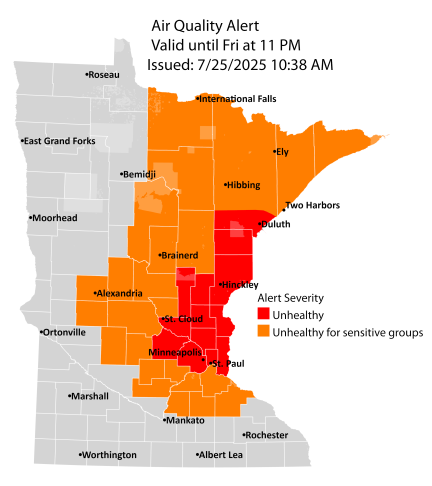
Air quality is expected to reach the red AQI category in east central Minnesota, which is unhealthy for everyone
The Minnesota Pollution Control Agency (MPCA) has cancelled portions of the air quality alert for western and southern Minnesota. The alert continues for east central and northeast Minnesota and runs until 11 p.m. on Friday, July 25. The affected area includes the Twin Cities metro area, Brainerd, Alexandria, Albert Lea, Marshall, Worthington, Hinckley, St. Cloud, Ortonville, Mankato, Bemidji, East Grand Forks, Moorhead, International Falls, Two Harbors, Hibbing, Ely, Duluth, Roseau, and the Tribal Nations of Upper Sioux, Mille Lacs, Prairie Island, Leech Lake, White Earth, Red Lake, Grand Portage, and Fond du Lac.
A band of heavy smoke from wildfires in Saskatchewan and Manitoba will continue to impact air quality across east central and northeast Minnesota on Friday. Smoke has exited the southern and western portions of the state and air quality has improved in these regions. Therefore, the air quality alert has been cancelled for these areas of the state. Smoke will linger across the alert area Friday afternoon, and then southerly winds are expected to push the smoke back to the north. The heaviest smoke is expected across east central Minnesota, and air quality in the red or unhealthy category is expected. Air quality should improve gradually beginning Friday afternoon, with improvement in fine particle levels below the alert threshold expected by the end of Friday.
Fine particle levels are expected to reach the red air quality index (AQI) category, a level considered unhealthy for everyone, across east central Minnesota. This area includes Brainerd, Alexandria, Hinckley, Ortonville, Bemidji, East Grand Forks, Moorhead, International Falls, Two Harbors, Hibbing, Ely, Duluth, Roseau, and the Tribal Nations of Mille Lacs, Leech Lake, White Earth, Red Lake, Grand Portage, and Fond du Lac. In the red area, sensitive groups should avoid prolonged or heavy exertion and limit time spent outdoors. Everyone should limit prolonged or heavy exertion and time spent outdoors.
Fine particle levels are expected to reach the orange AQI category, a level considered unhealthy for sensitive groups, across central and northeast Minnesota. This area includes the Twin Cities metro area, Albert Lea, Marshall, Worthington, St. Cloud, Mankato, and the Tribal Nations of Upper Sioux and Prairie Island. In the orange area, sensitive groups should limit prolonged or heavy exertion and time spent outdoors.